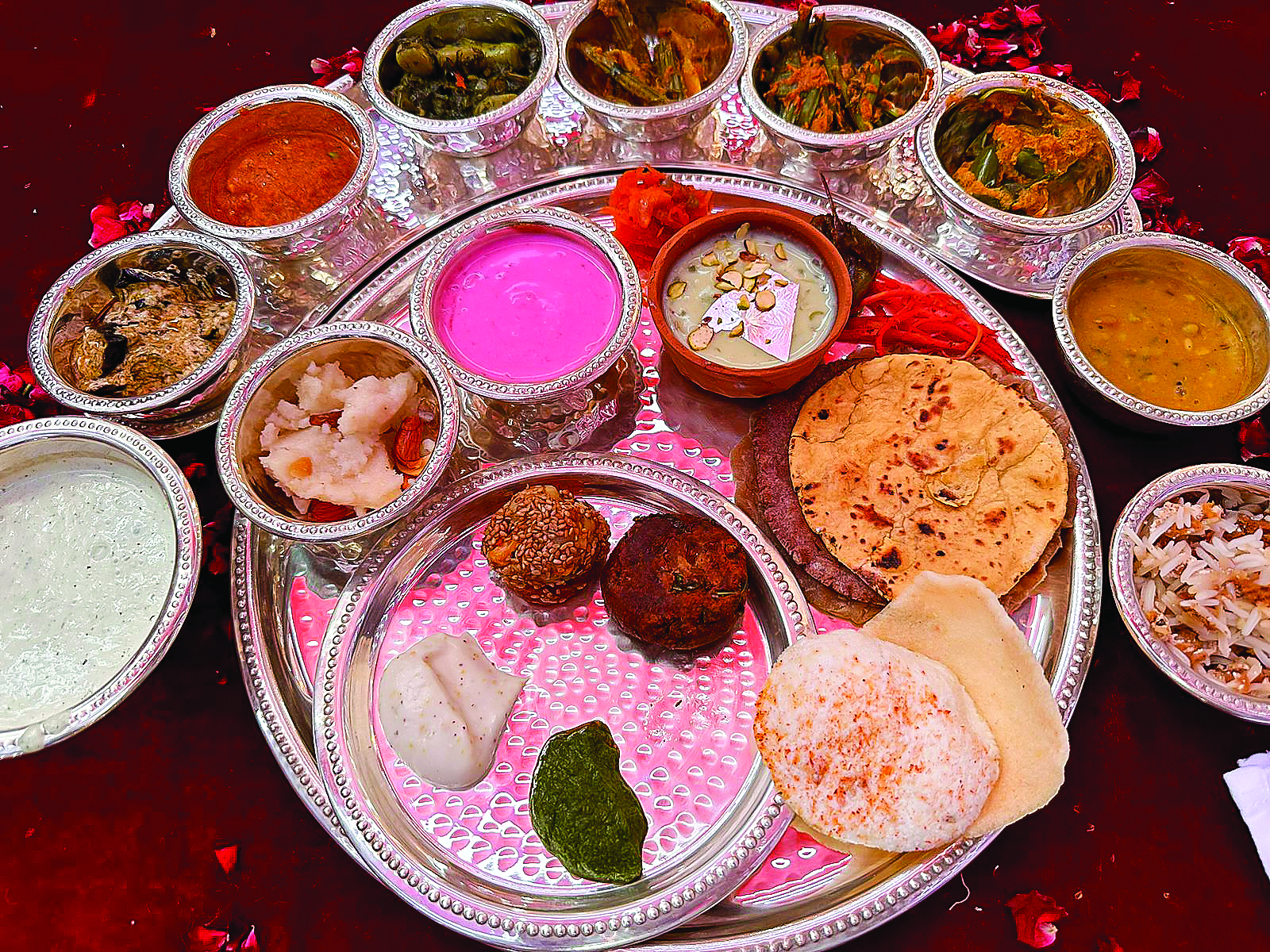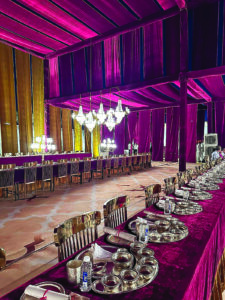
Royalty and nobility across the globe are known to have spent half their life inside jungles or in the battlefield, waging wars. Hence, their cuisine has largely focused on what they could hunt for in the jungles, or fish off the river, or even catch in the air…. Game cuisine, fowls and sea and river food being integral to their cuisine.
When Food for Thought, who were further invited by Ahmadabad Municipal Corporation to host a very large vegetarian food festival, contacted me to curate an all vegetarian, royal pavilion for them, my dilemma was genuine. How could a royal thali be all about pulses and leaves? Nevertheless, me and my forum, Kitchen of the Kings that research on, celebrates and helps conserve and present royal cuisine took up the challenge, inviting five distinct royal and noble kitchens to rustle up a perfect menu for a silver service dinner that would do the vegetarian story full justice.
The lineup though amazing, was also daunting. First up were Begum Zeba and Nawab Salauddin of Balasinore, who are known for their Afghan lineage. They themselves worked in creating vegetarian avatar the Balasinor cuisine which was ably tweaked by the begum and the nawab. A blend of recipes from the royal households of Balasinor, Palanpur, Radhanpur and Junagadh, the Balasinore Shahi Dastarkhwan was full of flavours and not extremely rich! They put together a Vegetarian selection of their classics including Hariyali ki Nazakat, Aman Ka Korma, Subz ke Shaami Kebab, Til ke Tukde, Motiya Kheer, Zarda e Jamiat inviting foodies to ‘nosh farmaiye’!

The bahu of Chotta Udaipur, Padmini Sinh entered the kitchen herself recreating the very tasteful pulse and rice rich recipes of her region. Her Sainjane (Moringa) – kadi patta sabzi and her khajur gur desert being a real winner.
We also invited the Rajmata of Gondal Kumud Kumari ji who added a rich dimension to the pavilion with her thali that presented a carefully curated selection of dishes from her best seller book: Recipes of a Maharani. A culinary genius, she took personal interest in the dinner. A gun salute state known for its car collection, its teapot museum and its rich array of collectibles, Gondal lovingly nurtured by royalty family is affluent not just in wealth but also its culture.
I personally reached out to Gauri ingle from Kolhapur who belongs to the culinarian family of Ingle and, though, the Marathas were known to be hard core non vegetarians she rustled up a stunning menu including her pickles, amti, bhakarwadi, Amti chi Vadi, Batata Longi and Sol Kadhi belting out the unique flavours of Kolhapur. The Ingle family are linked to the Chhatrapati family of Kolhapur through the wedding of Kamlabai Saheb, the daughter of Sardar Manyajirao Ingle who married H.H. Shrimant Rajashri Shahaji III Chhatrapati Maharaj, the Raja of Kolhapur. After this marital alliance, the Ingle family of Shendur in the former Kagal Jagir, moved to the erstwhile Kolhapur princely state. Holding the title of Maankari (an esteemed Noblemen) in the Kolhapur princely state Durbar, the Ingles continued to serve the rulers in various capacity.
The scions of the Ingle family, Ruturaj Dhairyasheelrao & Gauri Ingle founded Ekant, one of Kolhapur’s most revered culinary and hospitality enterprise with a vision to share the regal lifestyle of their forefathers with their guests. Bring them closer to the legacy of the Maratha rulers who were known for their indulgent art, majestic palaces, refined cuisine and resounding culture.
Last but not the least were Yuvraaj Amarjyoti and Yuvrani Meenal Kumari of Dhenkanal. Dhenkanal owes its name to a Savara chief named “Dhenka”, who ruled the land. Dhenkanal Palace, built in the 1830s, on the slopes of the Paniohala hill is the only fort cum palace in Odisha. Residence of the Raja of Dhenkanal and his family, the palace is situated in a craft-rich region of Odisha that boasts of over 15 thriving regional crafts. Culinary tradition of Odisha is unique and features vegetarian and non-vegetarian dishes, rice preparations and sweets. Royal family of Dhenkanal incorporated not only the traditional Odia dishes but also the flavours and recipes from other states to which the daughters-in-law of the family belong. Their mushroom crisply fried in rice batter, their tomato khajur chutney and their broad beans turning out finger licking good.